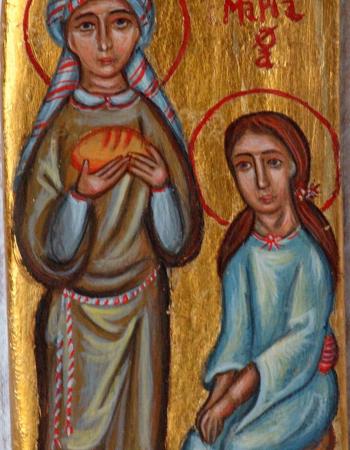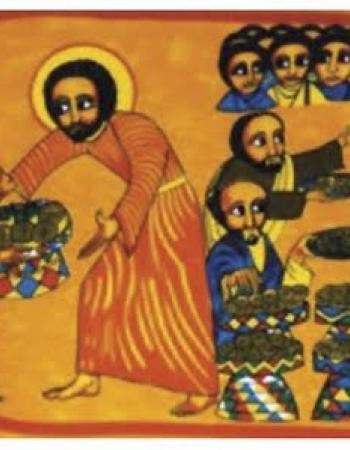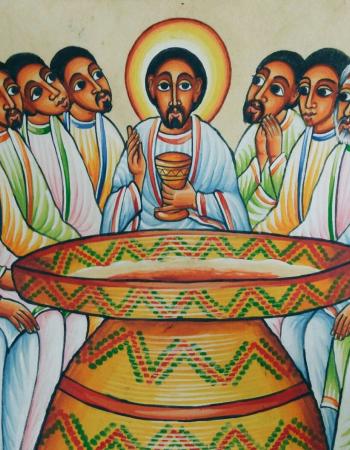Judith Scott writes: The time of Pentecost is a season of joy and celebration. But how to do this when the nation suffers from the effects of the Coronavirus pandemic and the protests surrounding police brutality and systems of malice and divisiveness?
We look back to our ancestors and times when they faced horror, yet took time to observe religious traditions as a way to reaffirm God’s presence in their lives. Passover was observed by those who could manage it in the horrific conditions of Nazi concentration camps. Soldiers on the front lines in WWI called their own Christmas truce to sing carols to each other. Mourners leaving the interment of a loved one in New Orleans dance in jubilation to the music of the second line jazz bands to celebrate the life of the one who died. I remember Thanksgiving Day, 1963, days after the Kennedy assassination, going to church and having our dinner in the midst of great sorrow. We learned to appreciate our family and friends and the blessings we still had.
So this year we come together in what the Orthodox community recognizes as a time of joyful sorrow, a paradox that asks us to understand that in the midst of trouble and tragedy God is still with us. We reaffirm our love and support for each other. And we open our hearts to joy. Instead of trying to force a false happiness when people are downhearted and exhausted with the external, we would do well to follow the words of Phoebe Farag Mikhail, “We must instead rest and reorient ourselves into a posture of receiving, not running. ...Joy is experienced through the giving and receiving of sacrificial love. ...The call to be eternally joyful is connected to the promise and hope of eternal life. Joy is living in the hope of the Resurrection, believing in that hope with our whole hearts, without a doubt. To live in the joy born of love and peace in the face of so much that reminds us of death instead of life, our faith offers us tools we can use to help us put joy into practice” (Putting Joy Into Practice: Seven Ways to Lift Your Spirit from the Early Church).
And one way to do this is to observe the centuries-old customs and traditions of our church.
Tanya Penkrat writes:
As we have just left the Paschal season, my thoughts have been turning to food, celebration and of course the great joy of the destruction of death and the affirmation of eternal life with the Lord God. It seems to me that food is so much at the center of who we are as Christians. Well, maybe it’s also because I had to go food shopping for the first time since before Pascha and was shocked how empty my larder was. In any case, even when I worked as the events coordinator at St. Vladimir’s Seminary, I used to joke with visitors who complimented our food. “After all,” I would say, “Orthodoxy is all about celebration and banquets, isn’t it? We try to live up to it at Seminary.”
Food. In the very first chapter of Genesis God gives humans food: “God said, ‘I give you every seed-bearing plant on the face of the whole earth and every tree that has fruit with seed in it. They will be yours for food” (Gen 1:29). Throughout scripture there is frequent reference to food, meals, feasts, banquets, and so on. The Cain and Abel story of fratricide occurs over a sacrifice to God that is a sacrifice of food. Abraham’s greeting of the three strangers with a hospitable meal of bread, “tender calf,” and curds and milk is a notable feast. It is especially important because apparently, he was visited by God and the three strangers are (according to Orthodox tradition) the first witness to a trinitarian God. Next, I remember, the Hebrews feast on lamb before leaving Egypt. They celebrate a “Passover” by marking their doors with the blood of that festival lamb so that the angel of death will pass by that household and let them live to escape Egypt immediately after. Further, When the Hebrews need food in the desert, God feeds them with manna falling from heaven, and brings forth water from a rock. And so on, with too many citations to mention here, except to say that humans cannot live without food. It mostly takes hard work to produce that food, and many conditions for this are out of human control. Therefore, food is the central issue of human life both ordinary, in celebration, and in worship.


Thinking about this most important “Last Supper,” I have to really ponder on what happened at that meal and how it affects us all. When Jesus Christ established Holy Communion at the last supper with his disciples, He told them to eat the bread as His body and drink the wine as His blood. What did that really mean? This statement was before He was crucified. He told the disciples to “remember” the bread and wine and its relatedness to His body and blood before they even could understand what Jesus intended. To this day, we often do not understand how this happens, what it means. Sad to say, some people (Leo Tolstoy among them) discount all of this as “magical mumbo-jumbo." Some of the disciples were confused and even offended that Jesus equated His body and blood to the bread and wine he was telling them to eat. It seemed like a kind of cannibalism. But Jesus was perfectly serious and, as in everything He did, very direct. What Jesus wanted to do (because of His love and sympathy for us) was reestablish the broken connection between humankind and God; broken through rebellion, disobedience, and an idolatrous desire in man to himself become “god” without God. That, of course, was impossible. Humans are created and limited and totally dependent on God for all things--and especially for life. Whereas God is Himself without limit, is Life and Being, without Whom nothing can exist or be. As humans broke the connection with God they naturally began to die. Human flesh is destructible, as all created matter is.
So it seems to me that Jesus Christ’s death on the cross did two things. One, by dying as a human, He entered “death,” (the state of matter without the presence of God) and, as God, His presence destroyed death. Two, Jesus wanted all humans to become as He was, both God and human in one person, reconnecting God and human, becoming truly His image and likeness. He gave us freedom--as He always does--to either accept or reject His offer (remember His parable of the Wedding Feast). Moreover, He used the bread and the wine to turn into His body and blood through the Holy Spirit, just as He allowed a Virgin to give birth to a human child through the action of the Holy Spirit, arriving on earth as both God and human in one person. Our acceptance is twofold as well: we provide the food (bread and wine) as a representation of our life (although we recognize that even this our gift is really given by Him, which is why we say it is "Thine own of Thine own"), offered for the liturgical sacrifice, and we give our faith and thanksgiving for the action of God entering the food so that we can be fed and changed into the body and blood of Jesus Christ. In a sense that is the new “covenant” between God and human: we totally “give” ourselves to becoming Jesus Christ in our bodies through commitment and the way we live our lives. He makes it possible by entering our bodies and working withing us through the Holy Spirit.
Even though the Paschal season is behind us for the year, we can seek to maintain it as the focus of our weekly life,: every liturgy is, in a sense, a Paschal celebration every Sunday. Our family Sunday meal can be our weekly Paschal celebration. I can remember the lean years after the war, when food was in short supply. But every Sunday meal was special and included meat as either chicken or “kotlety” (Russian for meat patties dredged in egg and bread crumbs). Later, it became fancier with roasts, or meat pies or special fish and seafood meals. But best of all was for us children when there were guests at our Sunday table with very special foods, and zakusky (appetizers) and toasts with wine and special breads and later delicious desserts, that were not common at our more spartan family meals. Mostly we were happy to have fruit.
How fortunate we are as Christians to have such weekly reasons for festivity. Even more fortunate that there are twelve major feasts celebrating the Life of Jesus Christ and the Theotokos. Sadly, we often allow the ordinariness--or more recently the turmoil and trauma--of daily existence to extinguish the joyfulness of our Christian reasons for festivity. Let us celebrate our God-given humanity in the image and likeness of God, who is awaiting us, his prodigal sons, with open arms, to feast on the “fatted calf” and return into His household.
The New Testament is filled with even more references to food. It is quite apparent that Jesus enjoys the companionship of his disciples and others, and having a meal is a common thing. His critics among the Pharisees and Scribes find it offensive that He eats with “sinners” and tax collectors and women of questionable morals. Yet Jesus’ mild response is that it is the sick who need a doctor, not the well. Obviously, He is referring to all of us. Many conversations and teachings happen over food, as the famous feeding of the multitude with 5 loaves and 2 fishes and later with 7 loaves and several fishes.
The Wedding Banquet parable is another instance of scriptural feasting where Jesus indicates that it is all of us the ordinary people of the byways who are welcomed because of our willingness to attend, rather than invited guests who refuse. One more example is the Wedding at Cana in St. John’s Gospel, where Jesus performs His first miracle of turning water into wine at His mother’s request, making the celebration even more wonderful by the fine quality of the wine. And, finally, we come to the Last Supper before the start of Christ’s Passion where He invites his disciples to eat the broken bread as remembrance of His body and drink the wine He offers as remembrance of His blood. This last banquet is something that has enduring importance for us to this day since it celebrates the means by which God feeds our bodies and souls to transfigure us into His sons and daughters.


Judith Scott, a former principal in the New York Public School system, received her masters in theology from Union Theological Seminary.
Tanya Penkrat was the former events coordinator at St. Vladimir's Seminary, where she had earlier received a masters degree in theology.



